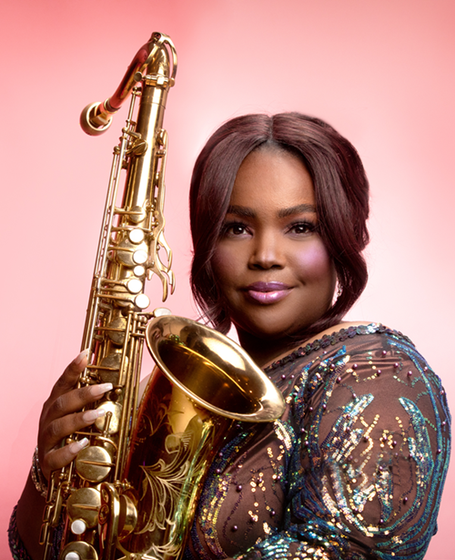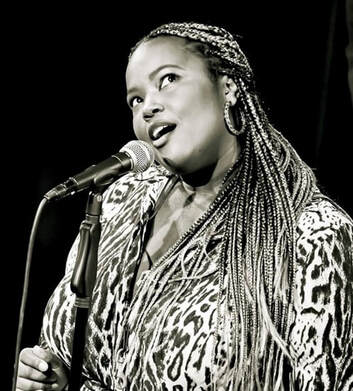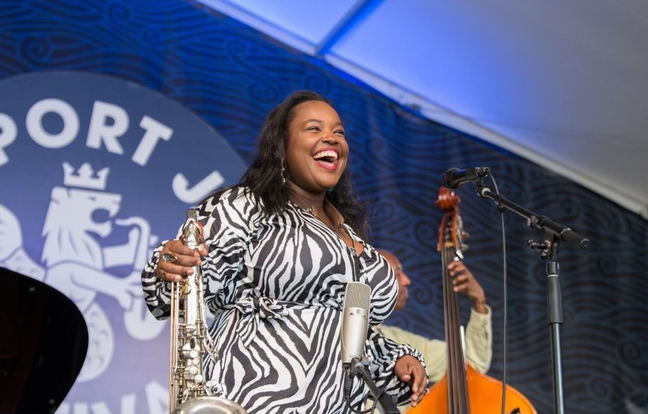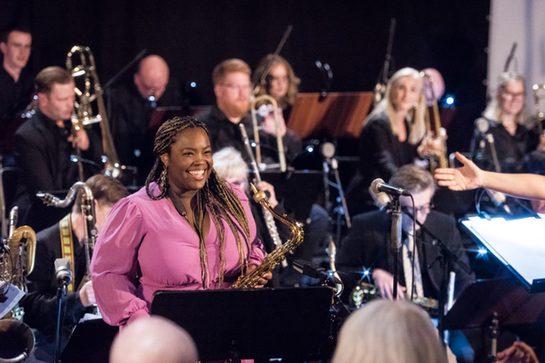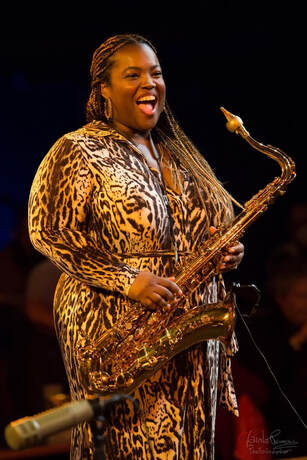January 2024 Featured Artist
Multitalented Jazz Artist Embraces Mentoring Others
While Juggling a Busy and Successful Career
An Interview with Saxophonist, Vocalist & Composer
Camille Thurman
|
Camille Thurman
Photo Credit: Daryon Haylock |
Camille Thurman is an accomplished composer, esteemed saxophonist, vocalist, and unique interpreter of the jazz tradition. She is quickly becoming one of the leading standard bearers of the art form, making a considerable and dynamic contribution to the legacy of jazz while paying tribute to its heroes.
This New York City native has amassed several distinctive honors for her musicianship: NAACP Image Award Nominee for Outstanding Jazz Album; Downbeat Magazine’s Critics Poll Nominee for Rising Star Tenor Saxophonist and Vocalist (2022, 2021 & 2020); 2022 Jazz Journalist Association Nominee for Tenor Saxophone; two-time winner of the ASCAP Herb Alpert Young Jazz Composers Award; a recipient of the Fulbright Scholars Cultural Ambassador Grant and Chamber Music of America Performance Plus Grant (Sponsored by the Doris Duke Charitable Foundation); among others. Camille was the first woman in 30 years to tour and perform full-time internationally with the world-renowned Jazz at Lincoln Center Orchestra as a saxophonist/woodwind doubler (2018-2020 season). A respected bandleader, she has headlined numerous notable concert venues and jazz festivals worldwide, including the Kennedy Center and Alice Tully Hall. She has four full-length recordings as a leader to her credit. Her most recent project, “Fortitude,” is a collaboration with master drummer Darrell Green and his quartet. In May 2020, Camille founded “The Haven Hang: Young Lioness Musician Q&A/ Virtual Mentorship Series" for young women musicians. The initiative is to mentor, share advice, and support young women pursuing careers in music and the performing arts. |
Camille Performing with the Darrell Green Quartet (Bryant Park, NYC)
Myrna Haskell, executive editor, was wowed by Camille's performance at The Falcon in Marlboro, New York, in August 2023. She spoke with her a few months later about her journey in the music industry and her passion for helping young women who hope to be where she is some day.
|
Did you take voice lessons? I’m asking because you are incredibly talented as both a musician and vocalist.
My mother directed a children’s choir, so I learned a lot from my experiences early on with the choir. But I never took formal voice lessons. You learned to play bass clarinet, flute and piccolo, but tenor sax is your forte. Do you still play all of these instruments? Actually, saxophone wasn’t my first choice. I played the flute first. My teacher Peter Archer realized that I was interested in learning as many instruments as possible [which we discussed could lead to playing on Broadway]. He offered his classroom during lunch for me to practice saxophone while I continued with the flute. I gave up my lunch periods, learned the fingerings, and by the next semester, I was up and running with the saxophone. I still play flute and clarinet. I also play these with my own personal projects. It’s another way of expressing myself. It gives me a lot of freedom and colors to play with. |
"A major force on the strength of either her voice or her tenor saxophone."
~ Downbeat magazine Photo Credit: Claudio Romani |
Do you get nervous before performances? What’s your pre-performance routine?
I really don’t get nervous that much. When I’m performing with my band, there’s so much going on before we go on stage that there’s no time to get nervous. I’ve had moments, though, when I do get nervous about playing a really difficult piece, but all you can do is your best. You don’t want your nerves to cause you to miss the moment.
The one thing I don’t do is eat right before a performance. When you sing, you have all that pressure on your diaphragm. If I do get nervous, I feel better on an empty stomach. Water is fine because you don’t want to have a dry throat.
I really don’t get nervous that much. When I’m performing with my band, there’s so much going on before we go on stage that there’s no time to get nervous. I’ve had moments, though, when I do get nervous about playing a really difficult piece, but all you can do is your best. You don’t want your nerves to cause you to miss the moment.
The one thing I don’t do is eat right before a performance. When you sing, you have all that pressure on your diaphragm. If I do get nervous, I feel better on an empty stomach. Water is fine because you don’t want to have a dry throat.
Camille Shining on Stage
Photo Credit: Nia Tate Photography
Photo Credit: Nia Tate Photography
Do you ever change your song list on the spot based on the audience vibe or energy?
Absolutely! Every show is different. In jazz, you’re so comfortable being in that space of the unpredictable and unknown. We trust ourselves to make it happen regardless of the circumstances. It usually works when you change things up based on the energy in the room. Sometimes I think, ‘They need this tune.’ You have to be conscious of what the audience is bringing to the concert, too.
Absolutely! Every show is different. In jazz, you’re so comfortable being in that space of the unpredictable and unknown. We trust ourselves to make it happen regardless of the circumstances. It usually works when you change things up based on the energy in the room. Sometimes I think, ‘They need this tune.’ You have to be conscious of what the audience is bringing to the concert, too.
You were the first woman in 30 years to tour internationally full-time with Wynton Marsalis (Managing and Artistic Director of Jazz at Lincoln Center Orchestra). Would you like to share a memory of an extra special performance during those years (2018-2020)?
I was the first woman to tour with him full-time, and there are so many memories. But there are two that come to mind right away.
I was the first woman to tour with him full-time, and there are so many memories. But there are two that come to mind right away.
|
The very first show I ever played was live-streamed all around the world. I was a little nervous as I walked on that stage with my instrument in my hand, not knowing what to expect. I had walked by that place every day going to school when I was sixteen, and I wondered what it would be like to play there – and here I was! I played a solo. After I finished and was introduced, the whole audience gave me a standing ovation. I realized it was a historic moment. This was the first time they were seeing a woman play with this orchestra.
Another instance was when I performed in Australia. One of the orchestra members told me there were people there to see me. I thought, What? I don’t know anyone here. I thought he was joking. But there was a group of young ladies waiting from an all-girls school to talk with me. They were in their uniforms, and this one girl was holding a poster as big as she was with my picture and bio printed on there. It said, ‘Camille Thurman Woman in Jazz.’ They asked me if I would sign their poster. The one holding the poster said, ‘When I see you up there, I see myself.’ You don’t feel the impact you’re making until you see it through others. |
Camille Performing with her Signature Smile
Photo Credit: Sophia Blomgren |
As you realized that young women were looking up to you, did this inspire you to be a guide or mentor for others in any way?
I started The Haven Hang during the pandemic. I was sitting at home (like everyone else) and thinking about how I always wanted to create a space where women musicians could develop their talents and talk about the things that scared them or things they just wanted to learn about. I had people asking me questions in social media…things I had asked myself when I was younger.
I created this live-streamed, mentoring platform where young ladies could ask questions and receive advice about a variety of topics: playing music, being a woman in the industry, what it took to become successful, how to build self-esteem, etc. This was a way for them to get access to other women in the music industry. There are 15 episodes on YouTube – free and accessible to everyone (musicians, educators, and others in the industry). I’ve gone to colleges and universities around the world to bring The Haven Hang to more people. Guests included other jazz artists, such as jazz singer Diana Reeves and Crystal Torres, trumpet player for Beyoncé. This platform provided a place for young women to connect and to understand that they are not alone.
Perhaps there is a woman musician whom you particularly admire.
I started The Haven Hang during the pandemic. I was sitting at home (like everyone else) and thinking about how I always wanted to create a space where women musicians could develop their talents and talk about the things that scared them or things they just wanted to learn about. I had people asking me questions in social media…things I had asked myself when I was younger.
I created this live-streamed, mentoring platform where young ladies could ask questions and receive advice about a variety of topics: playing music, being a woman in the industry, what it took to become successful, how to build self-esteem, etc. This was a way for them to get access to other women in the music industry. There are 15 episodes on YouTube – free and accessible to everyone (musicians, educators, and others in the industry). I’ve gone to colleges and universities around the world to bring The Haven Hang to more people. Guests included other jazz artists, such as jazz singer Diana Reeves and Crystal Torres, trumpet player for Beyoncé. This platform provided a place for young women to connect and to understand that they are not alone.
Perhaps there is a woman musician whom you particularly admire.
|
Vi Redd [1928-2022] was one of my heroes. When I first saw a video of her, it had a huge impact on me as a young musician. She was both a vocalist and saxophonist. Here was someone in the flesh doing exactly what I wanted to do. She was an inspiration.
You’ve shared the stage with many jazz legends. Is there an artist you’d love to perform with in the future? I absolutely would love to hit the stage with Patrice Rushen [an American jazz pianist]. She’s also one of my heroes. |
“You’re hard-pressed to find rising talents more exciting than Camille Thurman” ~ The New York Times |
You compose music as well. What is your creative process in this realm?
It’s a very organic and natural process. Sometimes I’ll put something on a voice memo. Sometimes I just jot it down. For the most part, if it comes to me, I receive it. If it doesn’t, I find inspiration elsewhere. This might be by looking at someone else’s body of work that I admire. Sometimes something comes to me from a theme, a concept, or even someone’s life I’m inspired by.
Do you have a favorite jazz composer?
I have several: Geri Allen, a phenomenal pianist and composer; Nadia Boulanger, a French classical composer and conductor; and I love Wayne Shorter, a saxophonist and composer. These composers tell stories, and they’re very colorful with it. I love composers who use melodies in a way that the composition has multiple stories but still has a common thread that takes you on a journey. If you close your eyes, you can feel and see that journey.
Can you share something you wish you’d done differently early on?
When I was younger, I wish I hadn't been so hard on myself. When you don’t see people in your field that look like you, you start to put pressure on yourself to be the best. That takes precedent over a focus on yourself and your own needs. If I’m the only girl in a group, I start to worry about messing up. Sometimes you get thrown into a situation when these [doubts] come up again. I remember when I first started working with the orchestra [Jazz at Lincoln Center Orchestra], these feelings came back. And I said to myself, why am I feeling this way again? I know what I’m doing now.
Any future plans you’d like to share?
I have a European tour coming up in May. The tour will be about three to four weeks long.
Any special preparations you make before touring abroad?
You have to give yourself time to prepare to leave. It’s a process. A big thing is packing smart. I know I’m going to be on the move, and I’m going to have to carry my own bag, so I don’t need to bring everything but the kitchen sink. It comes down to how to be efficient about packing. In particular, I try to make sure all the music I play is memorized. Paper is heavy. I also need to bring my performance dresses. I pack things that can be combined differently. I have to be sure I can launder everything properly, too. It’s smart to pack things that don’t need ironing. If something needs dry cleaning, I need to know if I’ll have access to that. Unfortunately, I can’t bring tons of shoes either. You also need room for merchandise and the items you need for your instrument.
Have you noticed anything about differences in accessibility to the arts while traveling outside the U.S.?
I’ve noticed in European countries and in Asia that the arts are very accessible. There is a respect and appreciation for the arts that we don’t always see here, and often the concerts are free for everyone. It’s beautiful to witness. Regardless of race, socioeconomic status, and cultural differences, the arts are available and accessible.
Where do you find sanctuary?
I find sanctuary in doing what I love – performing. I love the process, learning about myself, and developing my talents.
It’s a very organic and natural process. Sometimes I’ll put something on a voice memo. Sometimes I just jot it down. For the most part, if it comes to me, I receive it. If it doesn’t, I find inspiration elsewhere. This might be by looking at someone else’s body of work that I admire. Sometimes something comes to me from a theme, a concept, or even someone’s life I’m inspired by.
Do you have a favorite jazz composer?
I have several: Geri Allen, a phenomenal pianist and composer; Nadia Boulanger, a French classical composer and conductor; and I love Wayne Shorter, a saxophonist and composer. These composers tell stories, and they’re very colorful with it. I love composers who use melodies in a way that the composition has multiple stories but still has a common thread that takes you on a journey. If you close your eyes, you can feel and see that journey.
Can you share something you wish you’d done differently early on?
When I was younger, I wish I hadn't been so hard on myself. When you don’t see people in your field that look like you, you start to put pressure on yourself to be the best. That takes precedent over a focus on yourself and your own needs. If I’m the only girl in a group, I start to worry about messing up. Sometimes you get thrown into a situation when these [doubts] come up again. I remember when I first started working with the orchestra [Jazz at Lincoln Center Orchestra], these feelings came back. And I said to myself, why am I feeling this way again? I know what I’m doing now.
Any future plans you’d like to share?
I have a European tour coming up in May. The tour will be about three to four weeks long.
Any special preparations you make before touring abroad?
You have to give yourself time to prepare to leave. It’s a process. A big thing is packing smart. I know I’m going to be on the move, and I’m going to have to carry my own bag, so I don’t need to bring everything but the kitchen sink. It comes down to how to be efficient about packing. In particular, I try to make sure all the music I play is memorized. Paper is heavy. I also need to bring my performance dresses. I pack things that can be combined differently. I have to be sure I can launder everything properly, too. It’s smart to pack things that don’t need ironing. If something needs dry cleaning, I need to know if I’ll have access to that. Unfortunately, I can’t bring tons of shoes either. You also need room for merchandise and the items you need for your instrument.
Have you noticed anything about differences in accessibility to the arts while traveling outside the U.S.?
I’ve noticed in European countries and in Asia that the arts are very accessible. There is a respect and appreciation for the arts that we don’t always see here, and often the concerts are free for everyone. It’s beautiful to witness. Regardless of race, socioeconomic status, and cultural differences, the arts are available and accessible.
Where do you find sanctuary?
I find sanctuary in doing what I love – performing. I love the process, learning about myself, and developing my talents.
|
Photo Credit: Claudio Romani
|
UPCOMING PERFORMANCES:
January 12
Chelsea Table & Stage New York City January 19 The University of Oregon Jazz Festival Eugene, OR January 20 Vermont Jazz Center Brattleboro, VT MORE TOUR DATES |

